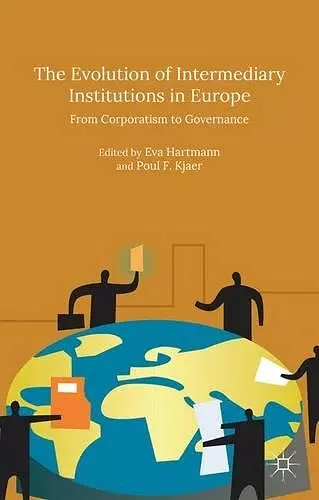The Evolution of Intermediary Institutions in Europe
From Corporatism to Governance
Poul F Kjaer editor Eva Hartmann editor
Format:Hardback
Publisher:Palgrave Macmillan
Published:3rd Aug '15
Currently unavailable, and unfortunately no date known when it will be back

"Hartmann and Kjaer have assembled a remarkable set of essays on one of the most profoundly important elements of societal transformation of this century as it affects an often neglected nexus point of law and politics. The contributions provide much needed gap filler, providing valuable insight on those important spaces between the state, the international order, and the social order." Larry Backer, Professor of Law and International Affairs, Penn State University, USA "This collection of essays is a countermove against the damage which the law of the EU experienced during the financial crisis. Seemingly paradoxically, this rescue operation is undertaken not by lawyers who tend to oscillate between the normalisation of Europe's emergency and voluntaristic propositions. It gains its encouraging strength from the exploration of long-term intra- and inter-societal transformations to which the law has to respond if it is ever to regain ordering legitimacy." Christian Joerges, Professor of Law and Society, Hertie School of Governance, Berlin, Germany
This book investigates the consecutive shifts between three types of intermediary institutions in the European context: Corporatist, Neo-corporatist and Governance institutions. It does so by combining insights from European Political Economy; European Integration and governance studies; and, socio-legal studies in the European context.This book investigates the consecutive shifts between three types of intermediary institutions in the European context: Corporatist, Neo-corporatist and Governance institutions. It does so by combining insights from European Political Economy; European Integration and governance studies; and, socio-legal studies in the European context.
“Scientists working on governance will therefore find food for thought in this book. It can also be used by those who work in a more policy-oriented way because it tends to reduce the vagueness sometimes associated with governance. … This book definitely pulls it off, with each chapter successful in clarifying in its own way the definition of intermediary institutions, in identifying some of their limits, and in setting a future research agenda.” (Anne Guisset, Transfer, Vol. 22 (3), August, 2016)
“Without doubt the strengths of the volume lie in its cross-disciplinary scope and decisive integration of the sociology of law into more traditional discussions of governance and political economy. … Furthermore, and in light of the dramatic evolution of the EU in the last decade … the volume is timely and will be of relevance for a number of debates about the EU. … this book is an important contribution in several key ways and deserves to be widely read.” (Ian Bruff, Capital & Class, Vol. 40 (3), 2016)
ISBN: 9781137484512
Dimensions: unknown
Weight: 4679g
277 pages
1st ed. 2015